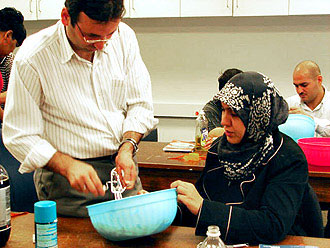Institute Keeps Elementary School Teachers Smiling
Since mid-July, the classrooms and science labs of Stanley Thomas, Blessey and Cudd halls have been bustling with activity and the sounds of learning as elementary school teachers get inspired by college professors.

In a physical science lab in Blessey Hall, Sevinc Dokmen and Cuneyt Dokmen, elementary school teachers at Abramson Science and Technology Charter School and husband and wife, work together on a science experiment to expand their classroom teaching techniques. (Photo by Kathryn Hobgood)
Nearly 50 third- and fourth-grade teachers are on the uptown campus at Tulane through today (July 31) as participants of NOLA SMILE (Science and Mathematics, Inquiry, Learning and Exploring).
The tuition-free institute is administered by the Recovery School District and Tulane's Teacher Certification Program, with support from the Tulane School of Science and Engineering, the Tulane School of Continuing Studies, the Tulane Center for Public Service and the Cowen Institute for Public Education Initiatives.
In one lab in Blessey Hall, Kim Johnson and Claudette Hunter, teachers from St. Rita School, worked on a science experiment, beating mounds of foam inside a colorful plastic bowl.
“We are mixing, soap, water and food coloring, to try to build foam and make it as thick as possible,” Hunter explained.
Around them, small clusters of teachers brainstormed about how to make the foam as stiff as possible, incorporating egg whites or starch into their concoctions. Later, their faculty supervisor, Tulane adjunct lecturer Jim Whelan, tested the foam's strength by inserting 12-inch wooden dowels into it.
In other classrooms, teachers experimented in areas of geometry, mathematics, measurement, science inquiry and grant writing refining their teaching skills through the use of laboratory equipment and workspace, computing facilities, libraries and other resources available through the university. All the participants worked with college-level scientists and mathematicians to increase their subject matter knowledge as defined by the Louisiana Comprehensive Curriculum, and hopefully, learning new ideas to take back to their own classrooms.
“The enthusiasm shown by the teachers has been phenomenal,” said Carol Whelan, a professor of practice in Tulane's Teacher Certification Program. She and Jean Pinney, science coordinator for the New Orleans Recovery School District, developed the NOLA SMILE institute with support and assistance from almost all major education groups in New Orleans.
Schools of all types are represented at the Institute a testament to the burgeoning partnerships to make education more progressive and effective in New Orleans
“What is exciting about this partnership is that at NOLA SMILE Institute, teachers from public schools as well as charter, parochial and private schools are represented,” said Whelan. “The development of the original NOLA SMILE proposal involved the Recovery School District administration, school leaders from the Recovery District Schools, Lusher Charter public school, the New Orleans Archdiocese, and private school Isidore Newman.”
Providing guidance in the development of the proposal were James MacLaren, a physicist and dean of the Newcomb-Tulane College at Tulane, and a representative from the Laser Inferometer Gravitational-Wave Observatory, a facility in Livingston, La.
“An unexpected byproduct of this institute is that the teachers are all writing grants for their own classrooms,” continued Whelan. “So this institute is not only extending their knowledge, but expanding their resources for their own classrooms. It's really empowering them.”
The teachers at the summer institute have committed to eight days of additional training over the school year.
Once they complete the program, they will earn graduate credit through Tulane's School of Continuing Studies at no personal expense, as NOLA SMILE is being funded by a Math Science Partnership grant program of the State Department of Education and the U.S. Department of Education.
